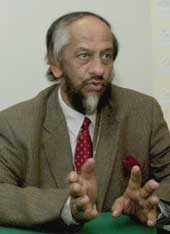 |
It was the mid-Sixties, and soot-spewing steam locomotives still dragged train coaches between dusty stations across India. A young mechanical engineer at a locomotive factory in Varanasi was doing his bit to phase steam locos out.
The engineer, Rajendra Pachauri, was helping build the diesel engines that would provide traction to the nation’s trains. Born in Nainital and with school years spent in Lucknow, Pachauri had given up engineering seats at the Indian Institute of Technology, Kharagpur, and at the University of Roorkee to join the mechanical engineering programme of the Indian Railways, selected for one among eight seats.
“The railways were seen as offering a promising career,” says Pachauri, who’s been the founder director of The Energy and Resources Institute (TERI) in New Delhi for nearly a quarter century and chairman of the Inter-governmental Panel on Climate Change (IPCC) since April 2002. When he is not managing TERI, Pachauri spends his time analysing climate changes and making it known to the world. Earlier this year, he delivered a talk to the world's top 100 CEOs in Florida and addressed the Finnish parliament. In April, he attended a climate change meeting in Addis Ababa even while nursing a thigh injured in a TERI vs Gillette cricket match in Delhi.
His move from engineering to energy and economics began while he was works manager in Varanasi for diesel locomotives. With a desire to return to academics, Pachauri left for the US where he acquired a masters and a PhD in industrial engineering from the North Carolina State University. The PhD involved studying economics, a subject that fascinated him so much that he completed a second PhD in economics. Prodded, Pachauri says that the best years of his life were while he was a student there.
Back home in the mid-Seventies, he joined the Administrative Staff College in Hyderabad where he set up a group to conduct research on energy policy. After spending a year at West Virginia University teaching the economics of natural resources, in 1982, Pachauri took over as director of TERI, an institution set up with a seed money of Rs 3.5 crore from the Tata group, to study energy policy. One early project at TERI examined whether India could save electricity by dividing the nation into two time zones ?eastern time and western time. Another analysed how compact fluorescent lights might help the economy.
In the beginning, TERI was a four-person institute working out of a single room. It has grown over the past two decades into a centre active in multiple research areas including energy and environment; industry, biotechnology and policy analysis covering the global environment; and environmental economics.
His growing involvement in climate change, Pachauri says, was a “natural progression” from energy economics. After all, it is linked to energy consumption patterns. Most scientists believe that the widespread use of fossil fuels and other fuels has been contributing to the warming of the planet.
Climate change is controversial. The biggest polluters are the developed countries that burn up far more fossil fuels than the developing countries. But the predicted impact of climate change, including a rise in sea level and the inundation of low-lying islands, will affect the entire world.
Pachauri’s election as chairman of the IPCC, an international organisation that assesses the scientific, technical and socio-economic information relevant to human-induced climate change, wasn’t without controversy. He won amid allegations by some that the US had opposed a second term for outgoing chairman Robert Watson, an atmospheric scientist, after an oil company lobbied against him. Pachauri won the election with 76 votes out of 132. Watson got 49, and a third candidate from Brazil seven.
As IPCC chairman, Pachauri heads an international group of scientists trying to convince the world in general and policymakers in particular that climate change will be harmful to all. It’s an assignment that involves travelling a lot and keeps Pachauri away from TERI ? and from corporate cricket. He makes up by keeping visits abroad as short as possible ? sometimes attending a meeting for just a few hours before boarding a plane to head back home.
IPCC is currently preparing its fourth assessment report due in 2007. It will highlight key patterns in climate change and its social and economic impact around the world. The plan, says Pachauri, is to produce a report that will help to mitigate the impact of climate change. “It’s a long journey and we’re short of time. We need to move quickly,” says he.










